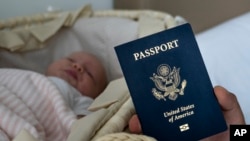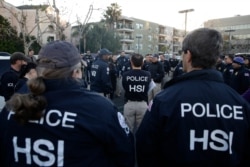As the Trump administration adds another hurdle to visitors coming to the U.S. from abroad, the limits of the law may restrict officials from stopping pregnant woman from obtaining visas.
The new visa rules published on Thursday by the U.S. Government is an attempt to curb “birth tourism,” the practice of coming to the U.S. with the express intent to give birth in the country to obtain U.S. citizenship for the child.
Under the rules, which take effect Jan. 24, 2020, consular officers may deny tourist visas if they believe the applicant is coming to the country for that reason.
But in order to avoid discrimination, those officials are limited in what they can ask, making the process of determining whether a visa applicant is intending to come to the U.S. to give birth difficult.
“The officer is actually restricted from asking if someone is pregnant, from asking if they are intending to get pregnant and from asking for proof that they're not pregnant,” explains Sarah Pierce, a policy analyst with the Migration Policy Institute in Washington, D.C. “Unless the foreign national naturally brings it up or is very obviously pregnant, I think the officer will really have their hands tied."
The new rules follow a pattern of actions by the Trump administration, which in the last three years has attempted to restrict immigrants and foreign visitors through a variety of policy changes. Trump in particular has expressed an interest in ending birthright citizenship, whereby nearly every child born in the country is granted citizenship. (The children born to diplomats are an exception.)
Instead, Pierce suggests that a more effective way to reduce “birth tourism” would be to dismantle the industry, which can involve medical personnel and places to stay until a woman gives birth.
“There are companies in the United States that practice birth tourism. They advertise to foreign nationals. They coach nationals on how to get through these visa interviews … They hook them up with medical treatment,” says Pierce.
And such attempts have happened in recent years. Law enforcement targeted a California-based network that resulted in a litany of criminal charges.
The underground networks that coordinate such travel can charge women tens of thousands of dollars to remain in the U.S. through childbirth.
Researchers at Children's Hospital of Orange County, in Southern California, note heightened health concerns for such babies.
"They were more likely to need surgery," said Dr. Michel Mikhael, lead author of the study. "And just because they have more complex problems, they were more likely to stay in the hospital longer."
The business models for an industry seeking to profit off of women’s bodies, however, extend beyond conventional “birth tourism.”
Last year, a public official was criminally charged for running an operation in which he allegedly arranged to fly pregnant women from the Marshall Islands to give birth in the U.S., then give up the babies for adoption.





